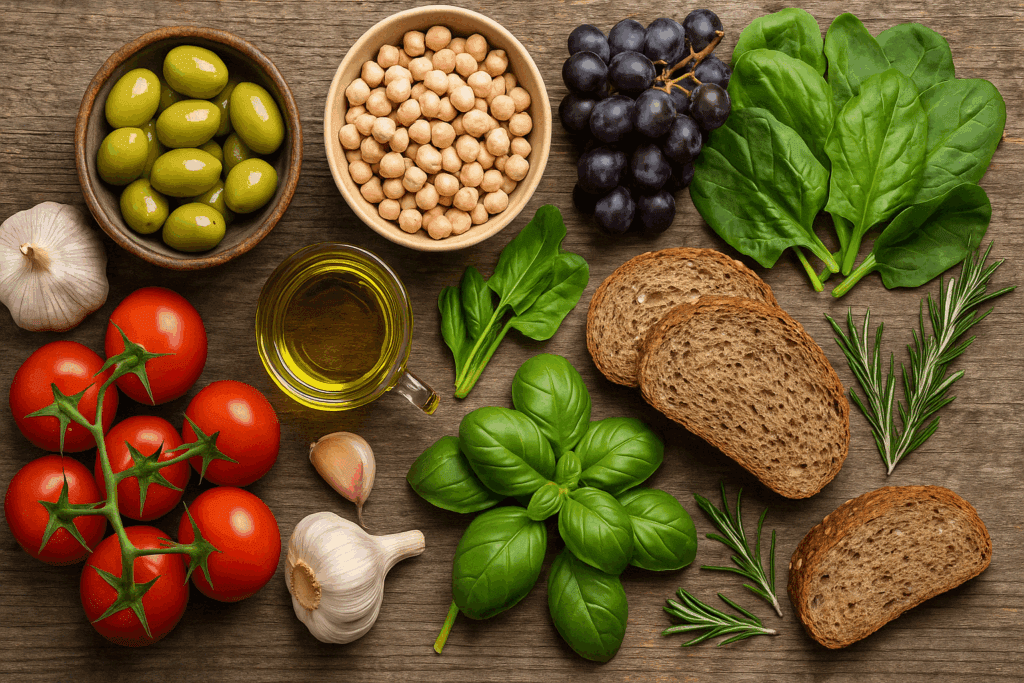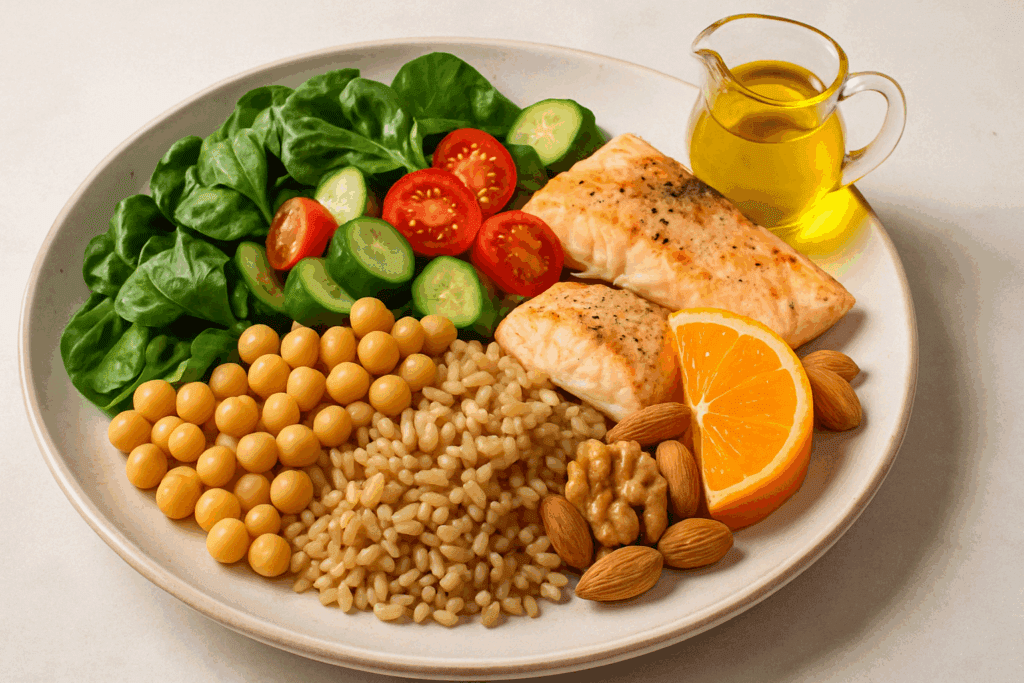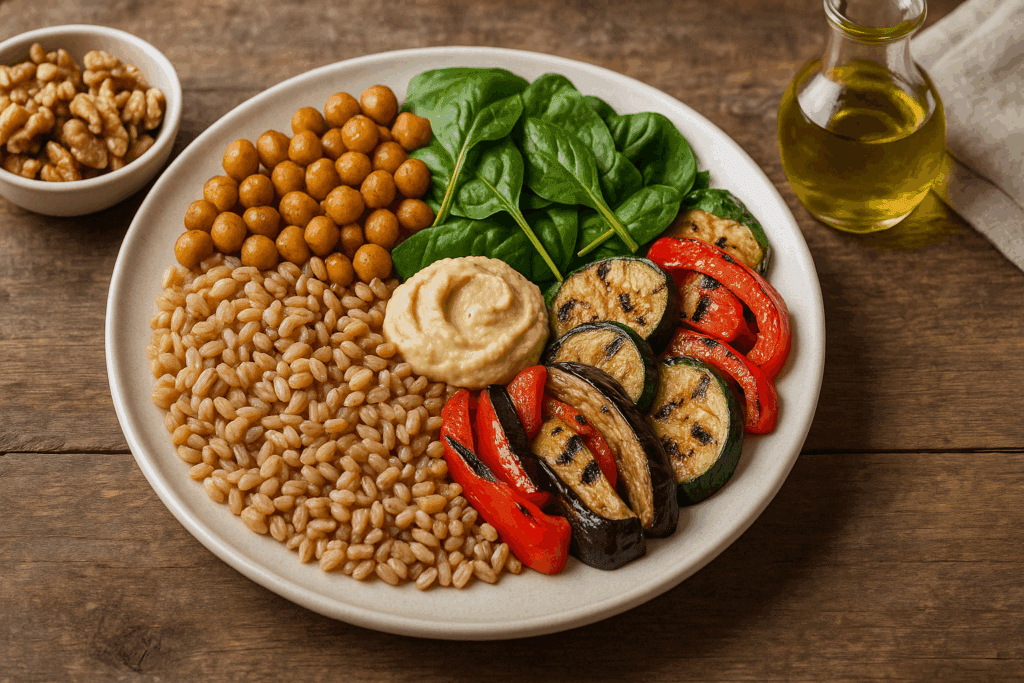The Mediterranean diet has long been celebrated as one of the healthiest ways to eat, offering a rich tapestry of flavors grounded in centuries of tradition and a wealth of evidence supporting its health benefits. For individuals seeking a sustainable and nourishing dietary pattern that prioritizes whole foods, plant-based ingredients, and cardiovascular well-being, the Mediterranean diet offers a compelling path forward. This guide explores how to start a Mediterranean diet in a way that aligns with modern lifestyles, scientific understanding, and a deep appreciation for cultural authenticity.
You may also like: Plant Based Diet vs Standard American Diet: What the Latest Studies Reveal About Long-Term Health Outcomes
Understanding the Mediterranean Diet and Its Origins
At its core, the Mediterranean diet is not a rigid set of rules but a flexible, balanced eating pattern inspired by the traditional dietary habits of countries bordering the Mediterranean Sea. Nations such as Greece, Italy, and southern France have long embraced a lifestyle that emphasizes fresh produce, whole grains, legumes, healthy fats, and moderate consumption of animal products. The hallmark of this diet is its foundation in plant-forward meals rich in nutrient-dense ingredients and robust flavors.
The concept of “fruits of the Mediterranean” goes beyond literal fruits like figs, oranges, and grapes. It also encapsulates the bounty of plant-based foods native to the region, including olives, lentils, chickpeas, and dark leafy greens. These foods are not only delicious but also packed with antioxidants, fiber, and healthy fats. The Mediterranean diet’s emphasis on seasonal and locally sourced foods enhances both its nutritional profile and sustainability.
Scientific research consistently supports the benefits of the Mediterranean diet for cardiovascular health, metabolic function, and overall longevity. It has been associated with lower rates of heart disease, diabetes, and certain types of cancer. Moreover, its anti-inflammatory properties and emphasis on healthy fats—such as those from extra virgin olive oil and nuts—further reinforce its status as a heart-healthy dietary approach.

Key Components of a Mediterranean Diet Meal Plan
Creating a Mediterranean diet meal plan begins with understanding the core food groups and their proportions. Vegetables, fruits, whole grains, legumes, nuts, and seeds form the base of every meal. Olive oil serves as the primary source of added fat, replacing less healthy fats like butter or margarine. Herbs and spices, rather than salt, are used to flavor dishes, which not only enhances taste but also contributes to the diet’s health-promoting properties.
Protein is predominantly plant-based, with lentils, beans, and whole grains providing a substantial portion of daily intake. Fish and seafood are consumed regularly—about two to three times per week—and poultry, eggs, and dairy are included in moderation. For those wondering, “is salmon included in the Mediterranean diet?” the answer is a resounding yes. Fatty fish like salmon, sardines, and mackerel are rich in omega-3 fatty acids and play a crucial role in supporting heart health.
Red meat is limited and often reserved for special occasions. This intentional moderation aligns with the Mediterranean plant-based diet’s ethos of prioritizing nutrient-dense, minimally processed foods. Desserts are typically fruit-based, and meals are enjoyed slowly, often in the company of others, promoting mindful eating and social connection.
How to Start a Mediterranean Diet Without Feeling Overwhelmed
Transitioning to a Mediterranean diet doesn’t require an all-or-nothing approach. In fact, gradual changes often lead to better long-term adherence and satisfaction. Start by incorporating more vegetables into your meals and replacing refined grains with whole grains like quinoa, bulgur, and farro. These grains are not only rich in fiber but also versatile and satisfying.
Replace butter and processed oils with extra virgin olive oil, which forms the cornerstone of the Mediterranean oil diet. Use it to sauté vegetables, dress salads, or drizzle over roasted dishes. Experiment with Mediterranean diet meal prep by making large batches of lentil soup, chickpea salads, or roasted vegetable platters to enjoy throughout the week. Meal prep not only saves time but also ensures you have healthy options readily available.
Building a Mediterranean diet shopping list is a practical way to stay focused and organized. Staples might include canned beans, whole grain pastas, fresh herbs, garlic, onions, and a variety of colorful produce. Don’t forget fermented dairy products like Greek yogurt and small portions of Mediterranean diet cheese such as feta or ricotta, which can add richness and depth to meals when used sparingly.

Is the Mediterranean Diet Heart Healthy?
The question “is the Mediterranean diet heart healthy?” is more than just a curiosity—it’s a key reason why many people adopt this eating pattern in the first place. The answer, supported by decades of research, is a definitive yes. The Mediterranean diet is consistently ranked as one of the most heart-friendly dietary approaches, thanks to its emphasis on unsaturated fats, fiber-rich foods, and a low intake of red and processed meats.
Its potential to reduce LDL cholesterol (the “bad” cholesterol) and raise HDL cholesterol (the “good” cholesterol) has been demonstrated in numerous clinical trials. For individuals exploring the Mediterranean diet for high cholesterol, adopting this eating pattern can lead to measurable improvements in lipid profiles and inflammatory markers. This makes it a powerful dietary strategy for those looking to lower cardiovascular risk without relying solely on medication.
Moreover, the diet’s inclusion of omega-3-rich fish, antioxidant-rich fruits and vegetables, and anti-inflammatory herbs provides a comprehensive approach to heart health. The question “can the Mediterranean diet lower cholesterol?” is often followed by discussions of long-term adherence, which is where the Mediterranean diet truly shines. Its palatability and variety make it easier to stick with over time, leading to more sustainable health outcomes.
Building Your Mediterranean Grocery List: Smart Choices for Everyday Cooking
Crafting a well-rounded Mediterranean grocery list is a crucial step in maintaining consistency with your new dietary habits. Start by stocking up on fresh produce—particularly dark leafy greens, tomatoes, cucumbers, zucchini, bell peppers, and eggplants. These vegetables are foundational to countless Mediterranean recipes and provide essential nutrients like potassium, magnesium, and vitamin C.
In terms of fruits, include both common and regional selections such as apples, oranges, grapes, figs, and dates. These “fruits of the Mediterranean” not only satisfy sweet cravings naturally but also contribute antioxidants and fiber. Whole grains like brown rice, barley, and couscous should also find a regular place in your pantry. If you’re wondering, “is rice Mediterranean diet appropriate?” the answer is yes—particularly when opting for unrefined versions.
Legumes such as lentils, chickpeas, and white beans are essential and can be incorporated into soups, stews, and salads. Nuts and seeds, including almonds, walnuts, and sunflower seeds, offer a nutritious snack or meal topper rich in healthy fats. Include a variety of herbs like basil, oregano, thyme, and rosemary, which not only enhance flavor but also contribute phytonutrients and anti-inflammatory properties.

Clarifying Common Questions About Mediterranean Diet Foods
A frequent question that arises is “can you eat cheese on the Mediterranean diet?” The answer is yes, but with moderation and mindfulness. Cheese is typically used as a condiment rather than a main ingredient, and varieties like feta, pecorino, and goat cheese are favored. Similarly, the question “can you have cheese on the Mediterranean diet?” speaks to the diet’s overall philosophy—nothing is forbidden, but balance is essential.
Another area of interest involves vegetables such as celery. You may wonder, “is celery on the Mediterranean diet?” Celery certainly fits within this dietary pattern and can be incorporated into soups, stews, and raw vegetable platters. It’s hydrating, low in calories, and rich in phytonutrients. Other commonly questioned foods include potatoes. Are potatoes allowed on the Mediterranean diet? Yes, particularly when consumed in their whole form, such as roasted or boiled with the skin on. This answers both “are potatoes ok on Mediterranean diet” and their versatility within plant-based dishes.
Drinks and Dining Out: Staying on Track Socially and Practically
One of the most enjoyable aspects of the Mediterranean diet is its flexibility when it comes to dining out. The phrase “Mediterranean diet eating out” reflects a growing number of restaurants offering plant-forward, heart-healthy dishes. Look for menu items that include grilled vegetables, legumes, whole grains, and seafood. Avoid fried options and request olive oil-based dressings or sauces when possible.
For beverages, “Mediterranean diet drinks” typically include water, herbal teas, and moderate amounts of red wine with meals. While alcohol is not required, small amounts of wine—especially when consumed with food—are considered part of the traditional Mediterranean pattern. However, it’s entirely possible to follow a Mediterranean diet without alcohol and still reap its health benefits.

Creating Balanced Meals Without Fish or Meat
Not everyone chooses to eat seafood, even when following a Mediterranean-style diet. For those who prefer a Mediterranean diet without fish, protein needs can be met through a thoughtful combination of legumes, whole grains, nuts, and dairy. Lentil and chickpea dishes, for instance, provide substantial protein and fiber while aligning with the diet’s plant-based principles.
Whole grains such as farro and freekeh pair well with beans to form complete proteins, making them excellent choices for vegetarians. Including a diverse array of plant foods also ensures a full spectrum of vitamins and minerals. This approach supports those exploring a fully Mediterranean plant-based diet, providing both nutritional adequacy and culinary satisfaction.
What Types of Food Are Mediterranean? Defining a Nutritional Legacy
When considering “what types of food are Mediterranean,” it’s helpful to visualize a colorful, abundant table set with dishes like tabbouleh, grilled eggplant, roasted red pepper hummus, and whole grain salads. These dishes reflect a tradition steeped in simplicity, quality ingredients, and culinary craftsmanship. Mediterranean cuisine is built on the principle of eating locally and seasonally, which not only improves taste but also enhances the nutrient density of meals.
The staples of this diet include not just fresh produce and grains, but also fermented dairy products, healthy oils, and moderate amounts of lean animal protein. The Mediterranean shopping list mirrors this diversity and encourages variety in the kitchen. While regional variations exist, the unifying theme is an emphasis on whole, unprocessed ingredients that are prepared with care.
Practical Strategies for Long-Term Success
Success with any dietary approach hinges on consistency, enjoyment, and sustainability. To stay motivated, consider planning your meals each week using a Mediterranean diet meal plan tailored to your taste preferences and lifestyle. Incorporate leftovers into your Mediterranean diet meal prep routine to minimize waste and simplify busy days.
Allow yourself flexibility and forgiveness—perfection is not the goal. Instead, aim to follow Mediterranean principles most of the time, knowing that occasional deviations won’t undo your progress. Surround yourself with Mediterranean flavors and experiences, from cooking new recipes to visiting markets with fresh ingredients. Consider digital platforms like Medieats if you’re exploring tools and support—just be sure to vet any plan for quality and evidence-based guidance, asking yourself, “is Medieats a good plan?”

Mediterranean Diet FAQ: Advanced Insights for Sustainable, Plant-Forward Living
1. What are some practical strategies for sticking to a Mediterranean diet when traveling or eating out?
Adhering to a Mediterranean diet while traveling or eating out can be both manageable and enjoyable with a bit of forethought. When dining out, seek restaurants with Mediterranean influences, as these often feature grilled vegetables, legumes, fish, and olive oil-based dishes that align with your goals. If you’re navigating unfamiliar menus, look for items that reflect typical components from your Mediterranean diet shopping list—such as whole grains, greens, and legumes. You can also plan ahead by packing small snacks like nuts or dried fruits of the Mediterranean, which help avoid impulse choices that might not fit within the Mediterranean diet meal plan. Being mindful of preparation methods—grilled over fried, olive oil over butter—lets you maintain the benefits of the Mediterranean diet even outside your kitchen.
2. How can I personalize a Mediterranean diet meal prep routine around a busy schedule?
The beauty of Mediterranean diet meal prep lies in its simplicity and adaptability. Start by preparing versatile base components—like roasted vegetables, quinoa, and lentil salads—that can be repurposed throughout the week. Incorporating the top 10 foods on a Mediterranean diet such as chickpeas, spinach, and tomatoes into batch-cooked meals helps create nutrient-rich dishes quickly. Include seasonal produce and pantry staples from your Mediterranean grocery list to streamline the process. Pre-portioning meals into grab-and-go containers can reduce decision fatigue and support healthy choices during high-stress days. With some structure and flexibility, even a packed calendar can accommodate a balanced Mediterranean plant-based diet.
3. Is celery on the Mediterranean diet, and what role can it play in meals?
Yes, celery is absolutely compatible with a Mediterranean diet and offers more than just crunch in a salad. While it may not be one of the most celebrated fruits of the Mediterranean, celery adds fiber, hydration, and antioxidants to your meals. It’s an excellent base for Mediterranean soups and stews, especially when paired with olive oil and tomatoes, as seen in many traditional dishes. Celery also blends well into dips like tzatziki or hummus, providing a refreshing and low-calorie vehicle for healthy Mediterranean diet drinks or snacks. Including celery regularly can enhance the nutritional density of your Mediterranean diet meal prep without complicating recipes.
4. Is salmon included in the Mediterranean diet, and are there specific preparation methods that enhance its benefits?
Yes, salmon is a valuable part of the Mediterranean diet and is often featured due to its rich content of heart-healthy omega-3 fatty acids. For those wondering, “is salmon included in the Mediterranean diet,” the answer is a resounding yes—but how it’s prepared matters. Grilling or baking salmon with a drizzle of olive oil, lemon, and fresh herbs aligns with the Mediterranean oil diet and preserves the fish’s nutritional value. Pair it with vegetables and whole grains from your Mediterranean diet meal plan to create balanced, anti-inflammatory meals. Consuming salmon two to three times per week can significantly support cardiovascular health, especially in individuals using the Mediterranean diet for high cholesterol.
5. How does the Mediterranean diet support long-term cholesterol management without medication?
For individuals considering whether the Mediterranean diet is good for lowering cholesterol, current evidence suggests that it can be highly effective when followed consistently. Its high content of monounsaturated fats from olive oil and nuts, along with soluble fiber from legumes and vegetables, helps reduce LDL cholesterol. Furthermore, omega-3-rich foods like sardines and salmon—key items on any Mediterranean shopping list—contribute to lower triglyceride levels. For sustained success, build a Mediterranean diet meal plan that limits saturated fats and emphasizes fresh, plant-based ingredients. While diet alone may not eliminate the need for medication in every case, it can substantially reduce dosage requirements and support better lipid control over time.
6. Can the Mediterranean diet be followed without consuming fish, and what are the alternatives?
Absolutely—the Mediterranean diet without fish is entirely possible and can still offer a wealth of health benefits. If you choose to avoid fish, focus on plant-based protein sources such as lentils, chickpeas, and whole grains, which are already central to the Mediterranean plant-based diet. Incorporate flaxseeds, walnuts, and chia seeds to provide alpha-linolenic acid (ALA), a plant-based form of omega-3s. Fortified foods and high-quality supplements may also help bridge nutrient gaps while maintaining the core principles of the Mediterranean diet. Whether you’re vegetarian, vegan, or simply reducing fish intake, a well-constructed Mediterranean diet meal plan can remain both nourishing and heart-healthy.
7. What are the most overlooked items to include on a Mediterranean grocery list for nutritional balance?
While staples like olive oil and tomatoes are well-known, several lesser-discussed items can add diversity and depth to your Mediterranean grocery list. Artichokes, fennel, and Swiss chard provide antioxidants and phytonutrients that contribute to the benefits of Mediterranean diet living. Fermented foods like kefir and aged cheeses are often forgotten, even though they support gut health and are compatible with the Mediterranean diet cheese spectrum. Adding ancient grains such as freekeh or farro can expand your fiber intake beyond basic rice or pasta—yes, rice is Mediterranean diet compatible, but variety is key. Finally, don’t overlook sea vegetables or dried herbs, which offer micronutrients often underrepresented in Western diets.
8. How do Mediterranean diet drinks fit into a balanced daily routine?
Mediterranean diet drinks are far more diverse than simply water or wine. Herbal teas like chamomile, mint, or sage are popular in Mediterranean cultures and offer antioxidants without added sugars. While moderate wine consumption with meals is traditional, it is by no means essential and should be approached mindfully, especially for individuals with health concerns. Infused waters with citrus or cucumber provide flavorful hydration that complements the fruits of the Mediterranean found in your meals. Including drinks that align with the Mediterranean oil diet—such as smoothies with avocado or almond milk—can offer functional nourishment while staying consistent with dietary goals. These beverages support hydration, digestion, and nutrient absorption, rounding out a thoughtful Mediterranean eating experience.
9. Are potatoes allowed on the Mediterranean diet, and how should they be prepared for optimal health benefits?
Yes, both questions—”are potatoes ok on Mediterranean diet” and “are potatoes allowed on Mediterranean diet”—have the same answer: they are allowed when prepared healthfully and eaten in moderation. Potatoes, especially when consumed with their skins, offer potassium, fiber, and resistant starch that support digestive and cardiovascular health. Instead of frying, roast them with garlic, rosemary, and olive oil to align with Mediterranean diet principles. Pair them with greens and legumes from your Mediterranean diet shopping list to ensure a balanced plate. Like rice, which is Mediterranean diet compatible when whole grain, potatoes should complement rather than dominate the meal.
10. Is Medieats a good plan for transitioning to a Mediterranean diet lifestyle?
Whether Medieats is a good plan depends on your individual needs, but it can be a useful tool for those learning how to start a Mediterranean diet. Platforms like Medieats offer structured support, access to meal ideas, and tips for Mediterranean diet meal prep that simplify adherence. However, it’s essential to evaluate whether the plan respects key elements of the Mediterranean plant-based diet, including whole ingredients and sustainable meal structures. Any tool or service should help you personalize your Mediterranean diet meal plan while reinforcing long-term behavior change. Used mindfully, Medieats can support your journey, but it should complement—not replace—education, intuition, and evidence-based guidance rooted in the benefits of the Mediterranean diet.

Reflecting on the Benefits of the Mediterranean Diet for Long-Term Wellness
Ultimately, adopting the Mediterranean diet is about more than just nutrition—it’s a lifestyle rooted in joy, community, and long-term health. As a dietary pattern, it has stood the test of time and continues to be validated by modern science. Whether you’re interested in the benefits of Mediterranean diet eating for heart health, longevity, or simply enjoying delicious, wholesome meals, this approach offers a powerful and flexible framework for lifelong wellness.
When implemented thoughtfully, the Mediterranean diet supports a broad spectrum of health goals, from managing high cholesterol to boosting energy and mental clarity. By focusing on whole, minimally processed foods and embracing plant-forward eating, individuals can enjoy a vibrant and sustainable path toward better health.
From the fruits of the Mediterranean to the rich diversity of grains, legumes, and vegetables that define its essence, this way of eating offers a practical and fulfilling route to wellness. With the right strategies, knowledge, and a bit of culinary curiosity, the Mediterranean diet can become a lasting part of your life—one that nourishes both body and spirit for years to come.
Was this article helpful? Don’t let it stop with you. Share it right now with someone who needs to see it—whether it’s a friend, a colleague, or your whole network. And if staying ahead on this topic matters to you, subscribe to this publication for the most up-to-date information. You’ll get the latest insights delivered straight to you—no searching, no missing out.
Further Reading:
Mediterranean diet for heart health
What is the Mediterranean Diet?
Disclaimer
The information contained in this article is provided for general informational purposes only and is not intended to serve as medical, legal, or professional advice. While NewsHealthWatch strives to present accurate, up-to-date, and reliable content, no warranty or guarantee, expressed or implied, is made regarding the completeness, accuracy, or adequacy of the information provided. Readers are strongly advised to seek the guidance of a qualified healthcare provider or other relevant professionals before acting on any information contained in this article. NewsHealthWatch, its authors, editors, and contributors expressly disclaim any liability for any damages, losses, or consequences arising directly or indirectly from the use, interpretation, or reliance on any information presented herein. The views and opinions expressed in this article are those of the author(s) and do not necessarily reflect the official policies or positions of NewsHealthWatch.

